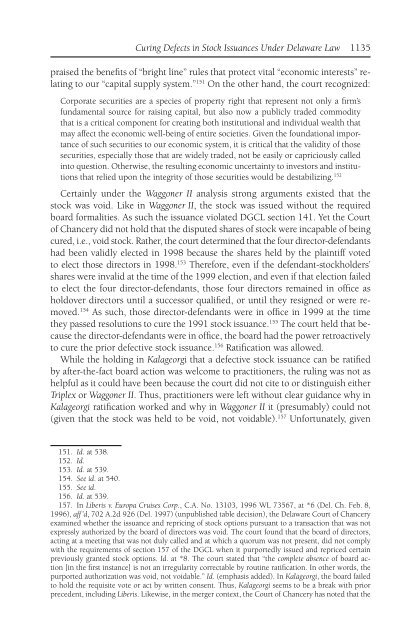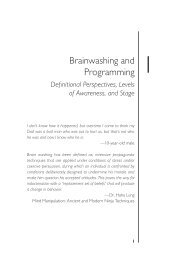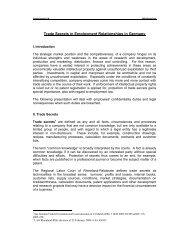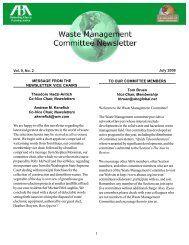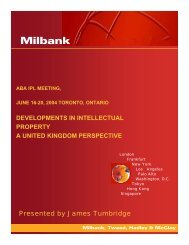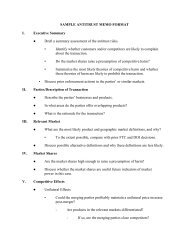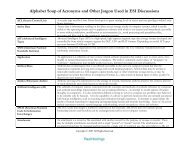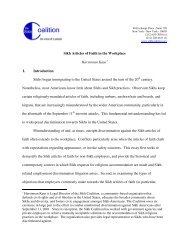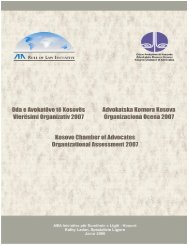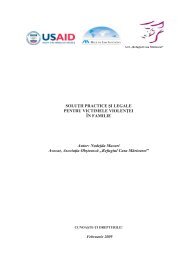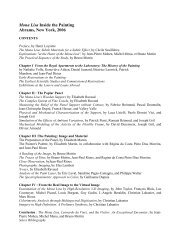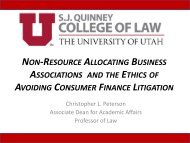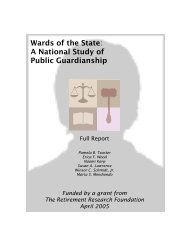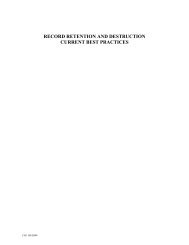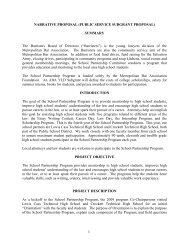Curing Defects in Stock Issuances - American Bar Association
Curing Defects in Stock Issuances - American Bar Association
Curing Defects in Stock Issuances - American Bar Association
You also want an ePaper? Increase the reach of your titles
YUMPU automatically turns print PDFs into web optimized ePapers that Google loves.
<strong>Cur<strong>in</strong>g</strong> <strong>Defects</strong> <strong>in</strong> <strong>Stock</strong> <strong>Issuances</strong> Under Delaware Law 1135<br />
praised the benefi ts of “bright l<strong>in</strong>e” rules that protect vital “economic <strong>in</strong>terests” relat<strong>in</strong>g<br />
to our “capital supply system.” 151 On the other hand, the court recognized:<br />
Corporate securities are a species of property right that represent not only a fi rm’s<br />
fundamental source for rais<strong>in</strong>g capital, but also now a publicly traded commodity<br />
that is a critical component for creat<strong>in</strong>g both <strong>in</strong>stitutional and <strong>in</strong>dividual wealth that<br />
may affect the economic well-be<strong>in</strong>g of entire societies. Given the foundational importance<br />
of such securities to our economic system, it is critical that the validity of those<br />
securities, especially those that are widely traded, not be easily or capriciously called<br />
<strong>in</strong>to question. Otherwise, the result<strong>in</strong>g economic uncerta<strong>in</strong>ty to <strong>in</strong>vestors and <strong>in</strong>stitutions<br />
that relied upon the <strong>in</strong>tegrity of those securities would be destabiliz<strong>in</strong>g. 152<br />
Certa<strong>in</strong>ly under the Waggoner II analysis strong arguments existed that the<br />
stock was void. Like <strong>in</strong> Waggoner II, the stock was issued without the required<br />
board formalities. As such the issuance violated DGCL section 141. Yet the Court<br />
of Chancery did not hold that the disputed shares of stock were <strong>in</strong>capable of be<strong>in</strong>g<br />
cured, i.e., void stock. Rather, the court determ<strong>in</strong>ed that the four director-defendants<br />
had been validly elected <strong>in</strong> 1998 because the shares held by the pla<strong>in</strong>tiff voted<br />
to elect those directors <strong>in</strong> 1998. 153 Therefore, even if the defendant-stockholders’<br />
shares were <strong>in</strong>valid at the time of the 1999 election, and even if that election failed<br />
to elect the four director-defendants, those four directors rema<strong>in</strong>ed <strong>in</strong> offi ce as<br />
holdover directors until a successor qualifi ed, or until they resigned or were removed.<br />
154 As such, those director-defendants were <strong>in</strong> offi ce <strong>in</strong> 1999 at the time<br />
they passed resolutions to cure the 1991 stock issuance. 155 The court held that because<br />
the director-defendants were <strong>in</strong> offi ce, the board had the power retroactively<br />
to cure the prior defective stock issuance. 156 Ratifi cation was allowed.<br />
While the hold<strong>in</strong>g <strong>in</strong> Kalageorgi that a defective stock issuance can be ratifi ed<br />
by after-the-fact board action was welcome to practitioners, the rul<strong>in</strong>g was not as<br />
helpful as it could have been because the court did not cite to or dist<strong>in</strong>guish either<br />
Triplex or Waggoner II. Thus, practitioners were left without clear guidance why <strong>in</strong><br />
Kalageorgi ratifi cation worked and why <strong>in</strong> Waggoner II it (presumably) could not<br />
(given that the stock was held to be void, not voidable). 157 Unfortunately, given<br />
151. Id. at 538.<br />
152. Id.<br />
153. Id. at 539.<br />
154. See id. at 540.<br />
155. See id.<br />
156. Id. at 539.<br />
157. In Liberis v. Europa Cruises Corp., C.A. No. 13103, 1996 WL 73567, at *6 (Del. Ch. Feb. 8,<br />
1996), aff ’d, 702 A.2d 926 (Del. 1997) (unpublished table decision), the Delaware Court of Chancery<br />
exam<strong>in</strong>ed whether the issuance and repric<strong>in</strong>g of stock options pursuant to a transaction that was not<br />
expressly authorized by the board of directors was void. The court found that the board of directors,<br />
act<strong>in</strong>g at a meet<strong>in</strong>g that was not duly called and at which a quorum was not present, did not comply<br />
with the requirements of section 157 of the DGCL when it purportedly issued and repriced certa<strong>in</strong><br />
previously granted stock options. Id. at *8. The court stated that “the complete absence of board action<br />
[<strong>in</strong> the fi rst <strong>in</strong>stance] is not an irregularity correctable by rout<strong>in</strong>e ratifi cation. In other words, the<br />
purported authorization was void, not voidable.” Id. (emphasis added). In Kalageorgi, the board failed<br />
to hold the requisite vote or act by written consent. Thus, Kalageorgi seems to be a break with prior<br />
precedent, <strong>in</strong>clud<strong>in</strong>g Liberis. Likewise, <strong>in</strong> the merger context, the Court of Chancery has noted that the


